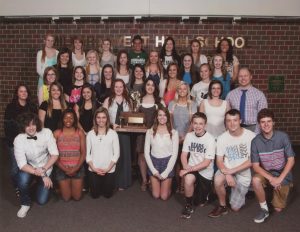Justice and Diversity League Prepares for Native Heritage Month
The Millard West club raises awareness for Native peoples’ past and concern for their future.

This photo represents Native American heritage month as it falls in November.
November 1, 2019
November is Native American Heritage Month, or as it is also referred to, American Indian and Alaska Native Heritage Month.
The month of November is a time to celebrate rich and diverse cultures, traditions and histories of Native people along with acknowledging their important contributions to society. Native Heritage Month is also an opportune time to educate the general public about tribes, to raise a general awareness about the unique challenges Native people have faced both historically and in the present and the ways in which tribal citizens have worked to conquer these challenges.
The Justice and Diversity League club takes the time to meet and talk about Native history in the US every year. During these meetings, they not only talk about the Native people, but also create posters to place around the school and post on social media. The club members met on Tuesday, October 29th to begin planning what they want to do this year.
So far the students like the idea of making a timeline out of posters to put across from Millard West’s library. They had done this the previous school year during Black History Month, and feel the idea would work well for now.
Bryant Bull, club leader, hopes that the posters will remind us all to take the opportunity this month to celebrate the various cultures, art, religions, languages, music and traditions of America’s Native peoples.
During this year’s Native American Heritage Month, Bull also hopes students will take a moment to remember the historic injustices inflicted on tribal nations. Ongoing discrimination and inequity inspired the creation of Native help programs, but time and again, agreements made with tribes were not honored, and the United States government did not keep its promises.
“The United States has broken more than 500 treaties signed with Native nations, it’s still a problem.”
The Justice and Diversity League was created to bring awareness to different groups of people and the hardships they have historically faced and challenges they encounter today.
“I believe groups like [the Justice and Diversity League], even if ours is small and pretty much confined to Millard, make big changes,” Bull said. “They’ve obviously seen some success. Water rights, tribal education, protection of graves, repatriation; they’re all areas of law where the activists have petitioned and protested for change.”
“Recently, though, Native people and nations find themselves increasingly under attack,” Bull said. “Tribal nations are being challenged by the interests of the government and corporations who seem to always forget about tribal sovereignty and laws. It’s a little sad and honestly maddening that, not only have we not made up for our wrong-doings, but we still can’t seem to stop doing wrong.”
Some of these struggles gain national attention; voting rights, sacred places, and environmental protections. Other fights go unnoticed, ignored, or misunderstood child welfare, violence against women, sovereignty and jurisdiction, but they are happening. Justice and Diversity League members find themselves coming back to the Native American topic with a large, growing number of legal battles over basic Native rights.
This year, the team hopes the concern for the well-being of Native peoples is shared by their peers, and not only for the month of November.






